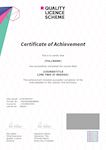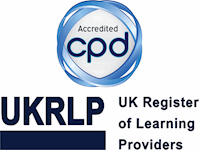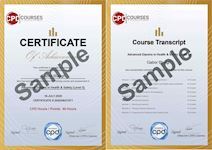- Exam(s) / assessment(s) is included in price
- Tutor is available to students
Accounting : Accountancy Training for Accountant
Diploma QLS Level 5 *Complete Course* |130 CPD Credits |*FREE PDF Certificate* |*Free Bookkeeping Course*
Staff Training Solutions
Summary
Overview
Accountancy
Diploma in Accounting & Finance QLS Level 5. Additional CPD Accredited Accountancy Certificate with 130 CPD points available with no extra study. This Accountancy course comes with easy to understand e-learning study materials.
Study Accountancy Level 5 for the opportunity to earn an endorsed Certificate of Achievement. Explore the field of professional Accountancy at Diploma Level 5, building the skills and knowledge to pursue a rewarding career in Accountancy . Get started on your endorsed Level 5 Accountancy Certificate right now!
Accountancy
If you’re serious about building a lifelong career as a qualified accountant, we’re serious about making it happen! Our most advanced Accounting - Diploma has been designed for ambitious candidates with the very top of the ladder in their sights. Accounting helps businesses to measure, monitor and plan their operations. Study from home at a pace that suits you for a endorsed Accounting - Diploma, which could transform your career prospects like never before. Backed by the committed support of your own personally-assigned tutor, success has never been so accessible!
Accountancy
This engaging Accountancy - Diploma introduces the most advanced complexities and core concepts of the industry in a digestible and structured manner. Explore the recent evolution of the Accounting profession, along with the skills required to confidently work with balance sheets, income statements, cash flow statements and more. Emerge qualified, capable and with the confidence to step into a high-level Accountancy position with an established organization, or perhaps start your own Accounting company from scratch.
Accountancy
This self-paced programme is available 24/7 providing you with the flexibility to train at the pace, location and time of your choosing. Endorsed certificate from a registered awarding body is available on course completion. College registration, tutor support, course materials and additional supporting material are all included in the course fee.
Quality Licence Scheme
This Accounting and Finance course is endorsed by the Quality Licence Scheme. The Quality Licence Scheme, endorses high-quality, non-regulated provision and training programmes.
Achievement
CPD
Course media
Description
Accountancy
Learning Outcomes
Accounting - Diploma units take students from the basic Accounting fundamentals to the various Accounting concepts used by the accountants for keeping records of the capital expenditure of a company. From understanding debits and credits and using simple T-Accounts to closing out the Accounts at the end of an Accounting period, producing the statement of retained earnings and balance sheet, you will learn how each step is completed.
Accounting course completion the learner should be able to;
- Explore the roles, advantages and limitations of contemporary corporate Accounting.
- Understand core duties and responsibilities of an Accountant
- Discuss four main types of financial statements;
- Identify and describe the three basic forms of business organizations;
- Understand how to work with t-Accounts and journals;
- Understand how to organize and record financial transactions;
- Outline the steps in the Accounting cycle;
- Explain how to close out a set of Accounts using a worksheet;
- Describe how to prepare a classified balance sheet;
- Understand what are sales variances, overhead variances, labour variances and cost variances
- Explain how to determine optimal cash balance.
Diploma Course Syllabus:
The Accountancy Diploma consists of the following units:
Unit 1 - Introduction to Accounting
This Accountancy unit covers the following key topics:
- Accounting and Finance
- Accounting
- Objectives of Accounting
- Scope of Accounting
- Functions of Accounting
- Advantages of Accounting
- Limitations of Accounting
- Evolution of Modern Accounting
- Branches of Accounting
- Modern View of Accounting
- Accounting Cycle
- Plus more
Unit 2 - The Role of An Accountant
This Accountancy unit covers the following key topics:
- Role of an Accountant
- Methods of Accounting
- Debit and Credit
- Types of Accounts
- Distinction between Book-Keeping and Accounting
- Organisation for Accounting and Finance
- Bases of Accounting
- Accounting Terminology
- Plus more
Unit 3 - Accounting Concepts and Standards
This Accountancy unit covers the following key topics:
- Concepts of accounting
- Accounting Framework
- Standards of accounting
- Plus more
Unit 4 - Journals and Subsidiary Books
This Accountancy unit covers the following key topics:
- Journal And Subsidiary
- Advantages of Journal
- Sub-Division of Journal
- Ledger
- Distinction between Journal and Ledger
- Subsidiary Books
- Basic Document for Subsidiary Books
- Advantage of Subsidiary Books
- Imprest System
- Plus more
Unit 5 - Profit And Loss Accounts
This Accountancy unit covers the following key topics:
- Statement of Profit and Loss
- Measurement of Income
- Preparation of Profit or Loss Account
- Plus more
Unit 6 - Balance Sheet
This Accountancy unit covers the following key topics:
- Balance Sheet
- Purpose of Financial Statements
- Prepare a Balance Sheet
- Assets
- Analyze a Balance Sheet
- Current Ratio
- Quick Ratio
- Working Capital
- Debt/Worth Ratio
- Plus more
Unit 7 - Cash Flow Statements
This Accountancy unit covers the following key topics:
- Cash Flow
- Initial Investment
- Cash
- Receivables
- Inventory, Supplies, and Prepaid Expenses
- Sources of Funds
- Funds from Operations
- Uses and Application of Funds
- Plus more
Unit 8 - Budgeting
This Accountancy unit covers the following key topics:
- Budget
- Financial Planning
- Budgetary Control
- Installing a Budgetary Control System
- Responsibility for Budgeting
- Key Factor
- Sales Work Sheet
- Fixed and Flexible Budgets
- Plus more
Unit 9 - Variance Analysis
This Accountancy unit covers the following key topics:
- Variance
- Types of Variance
- Direct Material Variances
- Computation of Labor Variances
- Control of Variances
- Variance Reporting
- Plus more
Unit 10 - Ratio Analysis
This Accountancy unit covers the following key topics:
- Classification of Ratio
- Norms for Evaluation
- Managerial Uses of The Primary Ratio
- Plus more
Unit 11 - Financial Management
This Accountancy unit covers the following key topics:
- Introduction to Financial Management
- Categories of Financial Management
- Scope of Financial Management
- Finance Functions
- Finance and Accounting
- Plus more
Unit 12 - Management of Working Capital
This Accountancy unit covers the following key topics:
- Significance of Working Capital
- Operating Cycle
- Concepts of Working Capital
- Kinds of Working Capital
- Components of Working Capital
- Importance of Working Capital Management
- Determinants of Working Capital Needs
- Approaches to Managing Working Capital
- Measuring Working Capital
- Working Capital Management Under Inflation
- Efficiency Criteria
- Plus more
Unit 13 - Investment Methods
This Accountancy unit covers the following key topics:
- Introduction to Investment Methods
- Types of Investment Proposals
- Project Report
- Methods of Appraisal
- Depreciation, Tax, and Inflows
- Cost of Capital
- Limitations of Investment Appraisal Techniques
- Plus more
Who is this course for?
Accountancy
- Candidates interested to start a career in accountancy
- Business owners seeking to look after their own accounts
- Existing accountancy workers in seeking for higher positions or promotion
- Accountancy workers with no formal qualifications
- Anyone wishing to boost their career prospects.
Requirements
Accountancy
There is no particular entry requirement.
Option 1
Accounting & Finance Diploma QLS Level 5 endorsed by Quality Licence Scheme
Certificate Fee: £120 + postal charges
Option 2
Accountancy Diploma issued by STS
PDF Certificate - FREE
Hard copy - £25 + postal charges
Option 3
CPD Accredited Certificate
(PDF format)=£30
(Hard copy)=£95 + postal charges
*Postage Charges: National £9, International £15
Career path
Accountancy
After completing Accountancy Level 5, Opportunities for employment may include working as an:
- Accounts Assistant
- Accounts Payable & Expenses Supervisor
- Accounts Payable Clerk
- Audit Trainee
- Payroll Administrator / Supervisor
- Tax Assistant / Accountant.
- Accounting Clerk
- Accounts Receivable Clerk
Questions and answers
Currently there are no Q&As for this course. Be the first to ask a question.
Reviews
Legal information
This course is advertised on reed.co.uk by the Course Provider, whose terms and conditions apply. Purchases are made directly from the Course Provider, and as such, content and materials are supplied by the Course Provider directly. Reed is acting as agent and not reseller in relation to this course. Reed's only responsibility is to facilitate your payment for the course. It is your responsibility to review and agree to the Course Provider's terms and conditions and satisfy yourself as to the suitability of the course you intend to purchase. Reed will not have any responsibility for the content of the course and/or associated materials.
FAQs
Interest free credit agreements provided by Zopa Bank Limited trading as DivideBuy are not regulated by the Financial Conduct Authority and do not fall under the jurisdiction of the Financial Ombudsman Service. Zopa Bank Limited trading as DivideBuy is authorised by the Prudential Regulation Authority and regulated by the Financial Conduct Authority and the Prudential Regulation Authority, and entered on the Financial Services Register (800542). Zopa Bank Limited (10627575) is incorporated in England & Wales and has its registered office at: 1st Floor, Cottons Centre, Tooley Street, London, SE1 2QG. VAT Number 281765280. DivideBuy's trading address is First Floor, Brunswick Court, Brunswick Street, Newcastle-under-Lyme, ST5 1HH. © Zopa Bank Limited 2024. All rights reserved.





